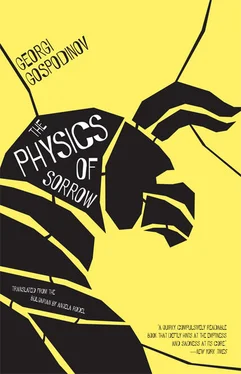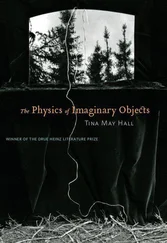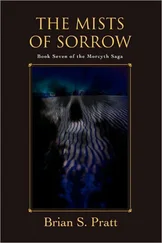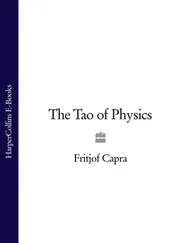And thus my journeys naturally came to an end. I returned to the saddest place in the world, shattered. All that remained from several years of hotels, airports and train stations were a couple of notebooks filled with hastily jotted impressions. Now, as I page through them distractedly to kill time, I finally realize it — melancholy is slowly swamping the world. Time has somehow gotten stuck and autumn doesn’t want to give way, every season is autumn. Global autumn. Traveling doesn’t cure sorrow, either. I need to look for something else.
The saddest place is the world.

1Peyo Yavorov, the most famous Bulgarian poet from the early twentieth-century, whose short and turbulent marriage ended in their double suicide, 1913–1914.
VIII. AN ELEMENTARY PHYSICS OF SORROW
These notes are stored on old punch cards from the dawn of electronic computing devices, which have long since fallen out of use.

QUANTA OF EQUIVOCATION
One of the most mindboggling things in the physics of elementary particles is how important the very act of observation is on their behavior. According to the Copenhagen interpretation, as early as the 1920s quanta act like particles only when we observe them. The rest of the time, hidden from our gaze, they are part of a scattered and supposedly disinterested wave, in which we don’t know exactly what’s going on. Everything there is possible, unforeseeable and variable. But once they sense we’re watching them, they instantaneously start acting as we expect them to, orderly and logically.
The world is the way we know it to be from the old textbooks only because (or when) it is under observation. Or as Idlis, Whitrow, and Dicke put it in the mid-twentieth century, “in order for the Universe to exist, it was necessary for observers to appear at some stage.” I’m watched, therefore I am.
OK, fine, but if no one’s watching me, do I still exist? I live alone, no one comes over, no one calls. On the other hand, there’s always one big invisible observer, an eye we should never forget. The Old One, as Einstein called him. Maybe that’s precisely what quantum physics or metaphysics is telling us. If we exist, that means we’re being watched. There is something or someone that never lets us out of its sight. Death comes when that thing stops watching us, when it turns away from us.
The world behind our backs is some kind of undefined quantum soup, says a Stanford physicist — but the second you turn around, it freezes into reality. I like that definition and never turn around too abruptly. I think about that teacher from kindergarten who threatened to pour my soup down my back if I didn’t eat it all. Then I would’ve found out what quantum reality is.
I write in the first person to make sure that I’m still alive.
I write in the third person to make sure that I’m not just a projection of my own self, that I’m three-dimensional and have a body. Sometimes I nudge a glass and note with satisfaction that it falls and breaks. So I do still exist and cause consequences.
If no one is watching me, then I’ll have to watch myself, so as not to turn into quantum soup.
Someone must constantly be watching and thinking about the world so that it exists. Or someone needs to be watching and thinking about the one who is watching and thinking about the world. Crazy stuff. Can I take on that round-the-clock duty?
The physics of elementary particles rehabilitates randomness and uncertainty. Now that’s why I love it. Whereas Einstein himself was horrified precisely by this and grumbled in his letters: “The theory says a lot, but does not really bring us any closer to the secret of the ‘Old One.’ I, at any rate, am convinced that He does not throw dice.” I, at any rate, am convinced that the Old One — just like the local geezers who spend their afternoons playing backgammon — nevertheless loves throwing dice.
One remark. Quantum physics — perhaps so as not to turn entirely into metaphysics — avoids delving into the question of who that observer could be in order to have such a status. Are we including anything here but the eye of God? Does the eye of man count as capable of maintaining the world? Does the eye of a snail, a cat, or a violet figure in the equation?
Well, we mustn’t forget, after all, that quantum physics explains things on the micro-level. But how can we be sure that God isn’t an elementary particle? It’s quite likely that he’s a proton, electron, or even a boson. God is a boson. It sounds nice. It sounds like God is a bison, Aya would say.
However, He’s most likely a photon — which has a dual nature like all quanta, but a rest mass of absolute zero. And that’s why it can move at the speed of light. When we say that God is light, we don’t even realize how deeply we’ve gotten into quantum physics. Or else he’s a neutrino, maybe even faster than light and capable of unexpected transformations. That which the old Evangelists/physicists described as the Transfiguration of the Lord was a transformation of the neutrino. But I still would like Him to be an ant, a turtle, or a Ginkgo biloba tree.
That which has not been told, just like that which has not happened — because they’re of the same order — possesses all possibilities, countless variations on how they could happen or be told.
Alas, the story is linear and you have to get rid of the detours every time, wall up the side corridors. The classical narrative is an annulling of the possibilities that rain down on you from all sides. Before you fix its boundaries, the world is full of parallel versions and corridors. All possible outcomes potter about only in hesitation and indecisiveness. And quantum physics, filled with indeterminacy and uncertainty, has proved this.
I try to leave space for other versions to happen, cavities in the story, more corridors, voices and rooms, unclosed-off stories, as well as secrets that we will not pry into. And there, where the story’s sin was not avoided, hopefully uncertainty was with us.
A QUESTION FROM THE QUANTUM PHYSICS OF READING
Has anyone ever developed a quantum physics of literature? If there, too, the lack of an observer presupposes all manner of combinations, just imagine what kind of carnival is raging among the elementary particles of the novel. What on earth is happening between its covers when no one is reading it? Now there are questions that deserve some thought.
EXPERIMENTS
That popular experiment with the electron, in which it acts like a wave and passes through two openings at the same time, gives certain grounds for believing that it is possible to be in different places at the same time. But, as the Gaustine in me notes, we’re not talking about electrons weighing 180 lbs. and standing 6’2”. (If this were so, my grandfather would have stayed in both villages — the Hungarian and the Bulgarian one, bringing up both of his sons, living out both of his lives.)
Luckily, the things I’m concerned with have no weight. The past, sorrow, literature — only these three weightless whales interest me. But quantum physics and the natural sciences have turned their backs on them. If Aristotle had known that the formal division of physics and metaphysics would definitively and artificially partition the universe of knowledge, he surely would have burned his work himself. Or at least he would have combined the parts of it.
A while back, under one of my pen names, I published a novel based on the atomism of Leuccipus of Miletus and Democritus of Abdera. Ultimately, it turns out that they discovered quanta way back in the fifth century BC. Lots of time needed to pass for everything to be forgotten. I liked those pre-Socratics, those first quantum physicists, who coolly and boldly painted a picture of a world made only of atoms and emptiness. Endless emptiness and countless atoms floating around in it. I wanted to transfer the model of atomism to literature and to discover whether the encounter between individual atoms of classic literature would produce new matter for the novel. An atomic novel of opening lines floating in the void.
Читать дальше














